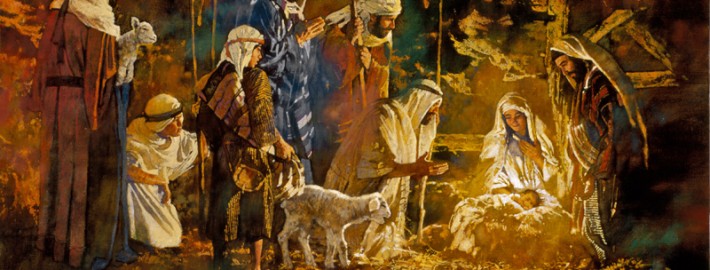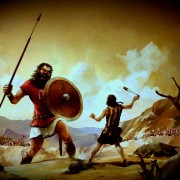Joy to the World
“… the Lord is come, let earth receive the king.”
So goes the Christmas carol we were taught in nursery school. And we sung it with all our feeble hearts and fumbling lips, looking forward to the Christmas gifts our parents will be buying us – the new shoes, clothes and fancy spectacles and cap. Alas, those were the days. But do we stop to ponder deeper into the Christmas story and imbibe its significance for not only our lives, but for the world at large? Today I intend to recap the Christmas story with a bit of New Testament historical background, and draw out implications for us of the birth of this Jesus. Fair warning that this post will be long, so have patience for it, for the story of Jesus’ birth, though simple, is actually quite a multi-layered one worth pondering deeply.
The story of Christmas is rooted in the story of Israel, and we must always attempt to tell it from that perspective. So here goes. Please note my usage of certain bolded words. They will come in handy in this and other posts.
2000 years before Jesus Christ, God called a certain man called Abram from amongst his family in Ur to a place called Canaan. He changed this man’s name to Abraham and gave him a promise.
“I will make you into a great nation, and I will bless you; … and all peoples on earth will be blessed through you” (Gen 12:2-3 NIV)
This promise Abraham diligently transmits to his children, who end up being exiled in Egypt for 470 years because of initial worldwide hunger and now forced into slavery. God however, miraculously leads them through Moses out of Egypt in triumphant fashion back to their own land. Now they have their land back, Torah is given to them as a way of life, and the tabernacle/temple is built for God to come and dwell in and supposedly never leave. They demand a king, and God gives them Saul and then David. God makes a promise to David.
“When your days are over and you rest with you fathers, I will raise up your offspring to succeed you, who will come from your own body, and I will establish his kingdom … Your house and your kingdom shall endure before me forever, your throne shall be established forever” (2 Sam 7:12-16 NIV).
Having received this prophecy, David himself prays in Ps 72 about that son of his thus (a Messianic Psalm – one which the Jews always looked to when thinking of the promised Son of David).
“He will judge your people in righteousness, your afflicted ones with justice … He will defend the afflicted among the people and save the children of the needy; he will crush the oppressor. He will endure as long as the sun … The kings of Tarshish and distant shores will bring tribute to him … All kings will bow down to him … All nations will be blessed through him, and they will call him blessed” (Ps 72:2-17)
From the above, one can see what this promised king is to do; by bringing hope to the afflicted, to the hopeless and needy; by subduing all kingdoms under him; and by being the means through which God’s promise to Abraham will be fulfilled in this world.
Well unfortunately, David’s throne did not last forever, and those who came after him increasingly departed from God’s ways. Finally, despite all the warnings of prophets like Jeremiah, they are uprooted and exiled for a second time in their history – this time forcefully – by the Babylonians.
For the next 250 years, they are separated from their land and the temple. The only thing that they still had was Torah, and they began to take it quite seriously as the only means of reconnecting with their God and their lost heritage. Prophets like Daniel, Isaiah and Ezekiel remind them of God’s promises to them and their forefathers, and expand those promises by giving further prophecies concerning a certain son of David will be the one to bring their deliverance forever.
They are released from exile and allowed to go back to their land. With much joy and hard work, they build a new temple, though not as resplendent and beautiful as Solomon’s temple (The history of Jews after this second temple was built is what is referred to as “2nd Temple Judaism”). Yet, they still feel like they are in exile, for though they live on their own land, they are being ruled remotely, first by the Persians who set them free, then by Alexandria and his protégés after him including the Ptolemys from Egypt, and then the Seleucids from Syria, and finally by Rome. They had a little bit of joy when Judas Maccabeus led a revolt to overthrow the Seleucid emperor Antiochus Epiphanes (who was receiving bribes from the highest bidder to appoint them High Priest of the Jewish temple), leading to the declaration of Hanukkah as a new Jewish festival. And yet soon enough the Romans came with their crushing military might, and they were back to square one.
For the next 300 years after returning from exile in Babylon, the question plaguing the people of Israel is when God will honor his promises of blessings to their fathers Abraham, Isaac and Jacob? When is he going to send that son of David to fulfill that promise of a kingdom that will last forever? What were they doing wrong that God was taking so long? In the meantime, while they waited for God to come and save them, their lifestyles were also being challenged by introduction of Greek culture which had dominated the world since Alexander’s conquests in a process called Hellenization (just like American culture is dominating our world today). This they felt was an affront to their Jewish ways of life, enshrined in Torah. To most Jews, Hellenization was a serious threat, and probably one of the reasons why God had not yet sent his salvation because of all these and other sins of the nation Israel.
No wonder then that most Jews believed in the message of one of the dominant groups of their time, the Pharisees. The Pharisees insisted that the faithful keeping of Torah will cause God to finally bring salvation to Israel. This is why the Pharisees were so worried about the keeping of Torah and guarding against Hellenization – unlike what Reformed theology has taught us since the 17th century; it was not that they felt keeping Torah will guarantee their ticket to heaven or make them personally “righteous”. It was about keeping it so God will look with mercy upon them and send his salvation to the nation Israel, and also that the individuals that kept Torah will then be mercifully received into the coming kingdom. No, they were not busy thinking of how to go to heaven as individuals, they were busy debating the nitty-gritty of how heaven may come to earth. One other question that was asked back then is “how will our forefathers who have waited for so long for this coming kingdom benefit from it?” The answer was resurrection; that all faithful Israel will resurrect with the coming of the Son of David to also partake of this wonderful kingdom.
Of course there were those who were more interested in keeping the status quo, and one of such groups was the Sadducees. They were the priests who run the temple with the head of their council being the High Priest. Israel was supposed to be ruled by 2 authorities – a king and a high priest. In times where their conquerors didn’t appoint a king, they gave all political power to the high priest and his council. And so, they were the real power brokers of their time, and were less interested in the faithful keeping of Torah etc., but more interested in just making sure the sacrifices went on as usual, the tithes were received as usual (so they could benefit from it, unsurprisingly) and the bribes were paid as usual to convince a Seleucid or Roman governor to appoint them/keep them as high priest for all its benefits. Obviously you can understand why your average Jew was fonder of a Pharisee than a Sadducee, as a careful reading of the Gospels will show. And as usual you can see the similarities between them and today’s dominant Christian “clergy”. Interestingly because of their past evils of causing the death of others who challenged their power, the Sadducees did not believe in resurrection.
Then there was the third stream, who felt that God was not going to come down from heaven with his own sword to come and remove the Romans. Just as Judas Maccabeus was successful with removing at one time the Seleucids by the use of violence, they must arm themselves and fight the oppressor. At least they respected the Pharisees, but the Sadducees they loathed and there were many murders of Sadducees, Roman soldiers stationed in Jerusalem and generally caused much violence. They were the Boko Haram of their time we may say. There were many such groups, with different names. From Zealots, to Sicarii they flourished in the dark. Barabbas was one of them (he wasn’t just a thief/rioter but more of a coup maker), as was the disciple Simon the Zealot (incorrectly interpreted as Simon the Canaanite in some bibles), who may/may not have recanted his violence to follow Jesus.
The Birth of Jesus
Enter the birth of Jesus Christ. Mary is confronted by an angel with the following news
“But the angel said to her, ‘Do not be afraid, Mary, you have found favor with God. You will be with child and give birth to a son, and you are to give him the name Jesus. He will be great and will be called the Son of the Most High. The Lord God will give him the throne of his father David, and he will reign over the house of Jacob forever; his kingdom will never end’” (Lk 1:30-33 NIV)
Mary being a proper Jew will know immediately how significant this message was. God was fulfilling his promises to exiled Israel; the king of the world was coming. He will wipe away all their sins of unfaithfulness to God, and he will restore Israel to the status of the capital of the world, and the Jews will be the “chilling brothers” in that kingdom. And the poor and broken hearted will find joy at last. The weight of being the carrier of this wonderful child was definitely heavy on her and she expresses it in Lk 1:46-56. This was joy to the world indeed.
Being a proper Jew, King Herod hearing about the son of God/David being born is an immediate challenge to him. Not because he will simply provide forgiveness of sins and carry us all to heaven as our modern gospel preachers from DL Moody to Billy Graham have over-simplified it to a fault for us, but because his coming signals an end to the reign of every king and every kingdom, even more so to a Jewish king. No wonder he will have all babies less than 3 years old in Bethlehem killed. This is indeed joy to the world, but not to him.
Even more dramatic is the fact that whoever is the son of God/David or the Messiah is actually supposed to be greater than any world power. Therefore Jesus being proclaimed the son of David simply means that Jesus is Lord, not the Roman Emperor, something which was scandalous at the time and has severe implications for all political power today. The reason Jews call Jesus “Lord” is not because he is merely their “Lord and Personal savior” – another questionable phrase in Christendom – but because he is the supreme emperor of both the visible and invisible world. He is Lord over both the Ghanaian and the American president, and just like any political figure, he demands our obedience in totality. Devout loyalty to any political institution is pure idolatry.
And yet his ways are different. He refuses to keep his Kingdom limited to the Jews only, contrary to the wishes of the Pharisees. He refuses to Lord it over his people, contrary to the Sadducees and their modern day descendants. And he refuses to establish his kingdom by violence, seriously disappointing the Zealots. He is king, yet on his own terms and through his own means of love and self-sacrifice.
Conclusion
And so, just as the world gets excited that Prince William’s wife is pregnant and about to give birth, Christmas is the time to remember when the king of the world left his throne in heaven, and was born into this fallen world; to walk amongst men and experience their suffering, and yet to bring them out of the deception of this world into one of love and care for one another and for care for his creation.
Chrismas is time when those of us who believe in him must make sure we practicalize his mission – to bring hope to the hopeless, joy to the broken-hearted and declare his kingship over all kings. As he stated clearly in Lk 4:18, his kingdom has already began and his good news is to the poor, to the brokenhearted, to the captives, to the blind and to the bruised. To the mentally oppressed, who can only resort to taking out guns and shooting 26 people and themselves, we must realize we have good news to spread; we have a king to declare and a kingdom to both express today and work towards in future. To the proud and haughty, we must remind that there is a king who calls them to do their part in bringing peace; justice and constant social and economic improvement (note I didn’t say equality). For the king of the world demands it, and he waits patiently to exert his judgment in due cause, when both the quick and the dead are brought before him.
JOY TO THE WORLD INDEED, FOR THE LORD IS COME.









Leave a Reply
Want to join the discussion?Feel free to contribute!